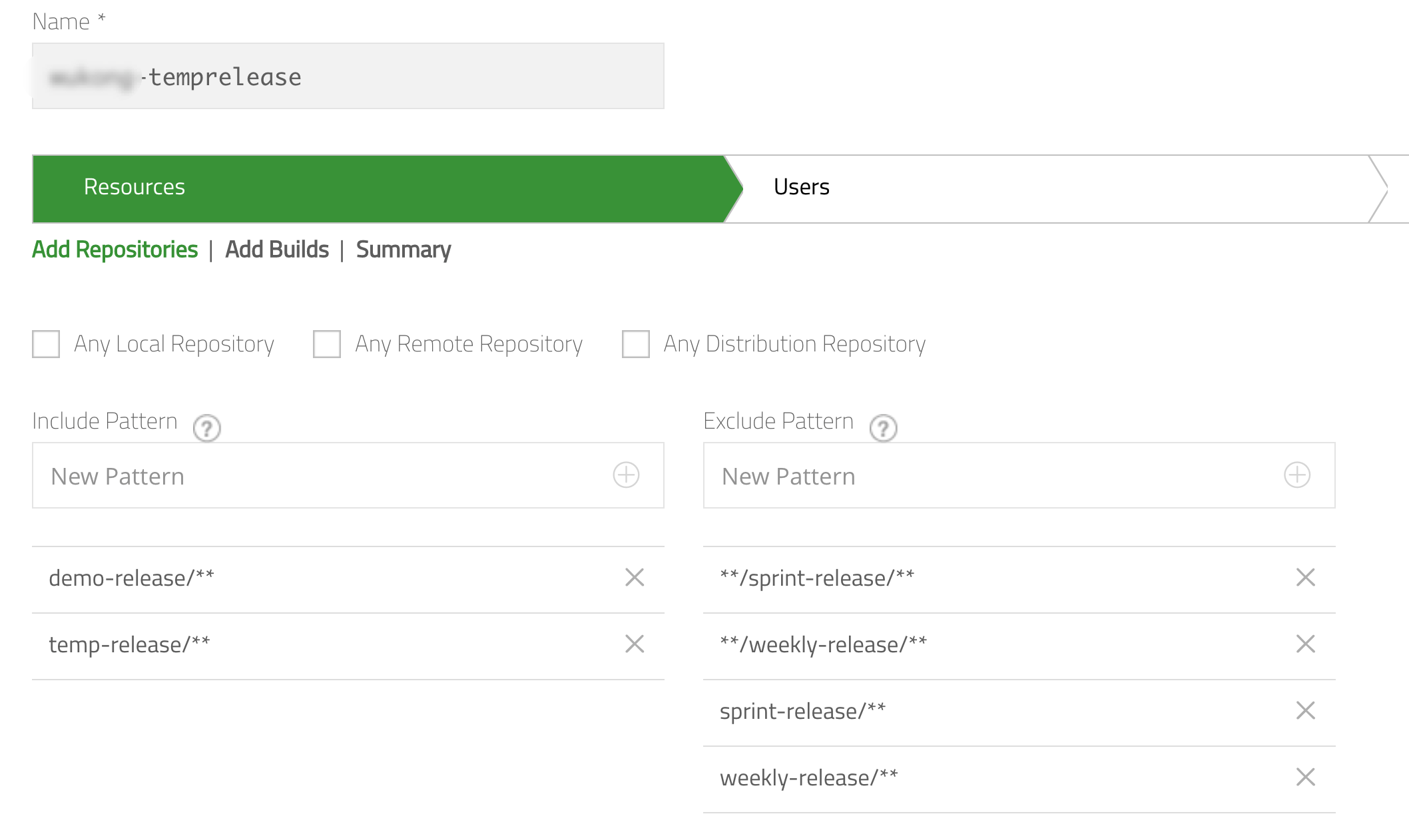[!NOTE|label:reference:]
- How to enable verbose log on JVM Garbage Collection
- JAVA_OPTIONS:
-verbose:gc -XX:+PrintGCDetails -XX:+PrintGCTimeStamps -Xloggc:/path/to/file/gc.log
reference
integration with pipeline
aql
Jenkins Artifactory Plugin AQL download latest artifact matching pattern
$pair = "$($art_user):$($art_pass)"
Write-Verbose "Attempting to convert Artifactory credentials to a base64 string for automation"
$encodedCreds = [System.Convert]::ToBase64String([System.Text.Encoding]::ASCII.GetBytes($pair))
$basicAuthValue = "Basic $encodedCreds"
$headers = @{
Authorization = $basicAuthValue
}
Write-Host "Attempting to perform a AQL search."
$aql_search = $art_base_url + "/api/search/aql"
Write-Host "Building aql query with the following parameters, groupID: $group_id, artifactID: $artifact_id, version: $version, classifier: $classifier and repos: $art_generic_repokey."
$aql_query = 'items.find({"repo":"' + $art_generic_repokey + '","$or":[{"$and":[{"path":{"$match":"' + $group_id + '/' + $artifact_id + '/' + $version + '"},"name":{"$match":"' + $artifact_id + '*' + $classifier + '*.' + $extension + '"}}]}]}).sort({"$desc":["modified"]}).limit(1)'
Write-Host "Built the following aql query: '$aql_query' ."
$aql_content = Invoke-RestMethod -Uri $aql_search -Headers $headers -Method Post -Body $aql_query -ContentType 'text/plain'
Write-Host "Attempting to submit the aql query to the following artifactory server: $art_base_url."
$aql_results = ($aql_content).results
Write-Host "Attempting to parse query results and build the artifact download uri."
$aql_repo,$aql_path,$aql_name = ($aql_results).repo,($aql_results).path,($aql_results).name
$artifactDownloadUri = $art_base_url + '/' + $aql_repo + '/' + $aql_path + '/' + $aql_name
Write-Host "Found the following uri: $artifactDownloadUri !!"
if ($artifactMimeType -eq 'application/zip' -or $extension -eq 'zip') {
Write-Verbose "Attempting to save the artifact to $download_dir/$art_dist_name.zip"
Invoke-RestMethod -Uri $artifactDownloadUri -Headers $headers -OutFile "$download_dir/$art_dist_name.zip"
}
Artifactory SSL Certification
[!NOTE|label:references:]
- ARTIFACTORY: How to Resolve an “unable to find valid certification path to requested target” Error
- Using TLS Certificates as a Client
- Working with Certificates and SSL
- ibook : ssl/keystore
[!TIP|label:see also:]
get remote cert
$ openssl s_client -showcerts -connect <domain.com>:<port>
#i.e.
$ echo -n |
openssl s_client -connect <domain.com>:<port> -debug |
sed -ne '/-BEGIN CERTIFICATE-/,/-END CERTIFICATE-/p' > <domain>.crt
# or
$ keytool -printcert \
-rfc \
-sslserver <domain.com>:<port> > <domain>.crt
# or
# https://www.howtouselinux.com/post/openssl-command-to-generate-view-check-certificate
$ echo -n |
openssl s_client \
[-servername <domain.com>] \
-connect <domain.com>:<port> 2>/dev/null |
openssl x509
[!NOTE] if
issue (i:)is the same assubject (s:). Therefore, this is the root certificat. i.e. :$ openssl s_client -connect cdn.redhat.com:443 -showcerts < /dev/null Certificate chain 0 s:C = US, ST = North Carolina, O = "Red Hat, Inc.", OU = Red Hat Network, CN = cdn.redhat.com i:C = US, ST = North Carolina, O = "Red Hat, Inc.", OU = Red Hat Network, CN = Red Hat Entitlement Operations Authority, emailAddress = ca-support@redhat.com -----BEGIN CERTIFICATE----- ... -----END CERTIFICATE----- 1 s:C = US, ST = North Carolina, O = "Red Hat, Inc.", OU = Red Hat Network, CN = Red Hat Entitlement Operations Authority, emailAddress = ca-support@redhat.com i:C = US, ST = North Carolina, L = Raleigh, O = "Red Hat, Inc.", OU = Red Hat Network, CN = Entitlement Master CA, emailAddress = ca-support@redhat.com -----BEGIN CERTIFICATE----- ... -----END CERTIFICATE----- 2 s:C = US, ST = North Carolina, L = Raleigh, O = "Red Hat, Inc.", OU = Red Hat Network, CN = Entitlement Master CA, emailAddress = ca-support@redhat.com i:C = US, ST = North Carolina, L = Raleigh, O = "Red Hat, Inc.", OU = Red Hat Network, CN = Entitlement Master CA, emailAddress = ca-support@redhat.com -----BEGIN CERTIFICATE----- ... -----END CERTIFICATE-----
import to truststore
$ sudo keytool -importcert \
-keystore /usr/local/java/jdk1.8.0_60/jre/lib/security/cacerts \
-storepass changeit \
-file <domain>.crt \
-alias "<domain>-crt"
configuration
allow partial folder in particular repo

access token
[!NOTE|label:references:]
generating expirable tokens
- from version 7.21.1, this can be specified by setting the
token.max-expiryparameter in the$JFROG_HOME/artifactory/var/etc/artifactory/access.config.ymlfile ( prior to version 7.21.1, the parameter to set wasartifactory.access.token.non.admin.max.expires.in). - if the
token.max-expiryis equal to 0 (which is the default), there is no limitation to the token expiry. However, if the maximum expiry is greater than 0, the user cannot create a non-expirable token. - the
token.max-expiryparameter must be set to a value higher than thetoken.default-expiryparameter value.
setup repository
debian/ubuntu
[!NOTE|label:references:]